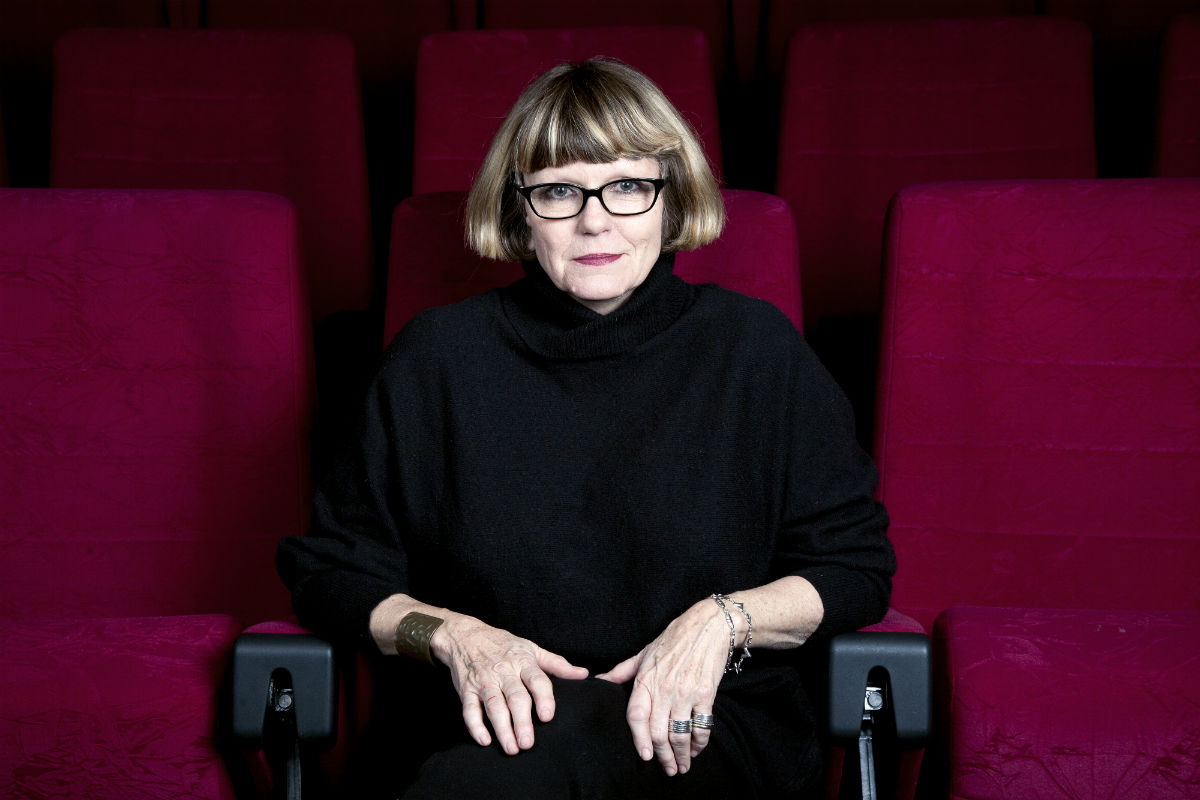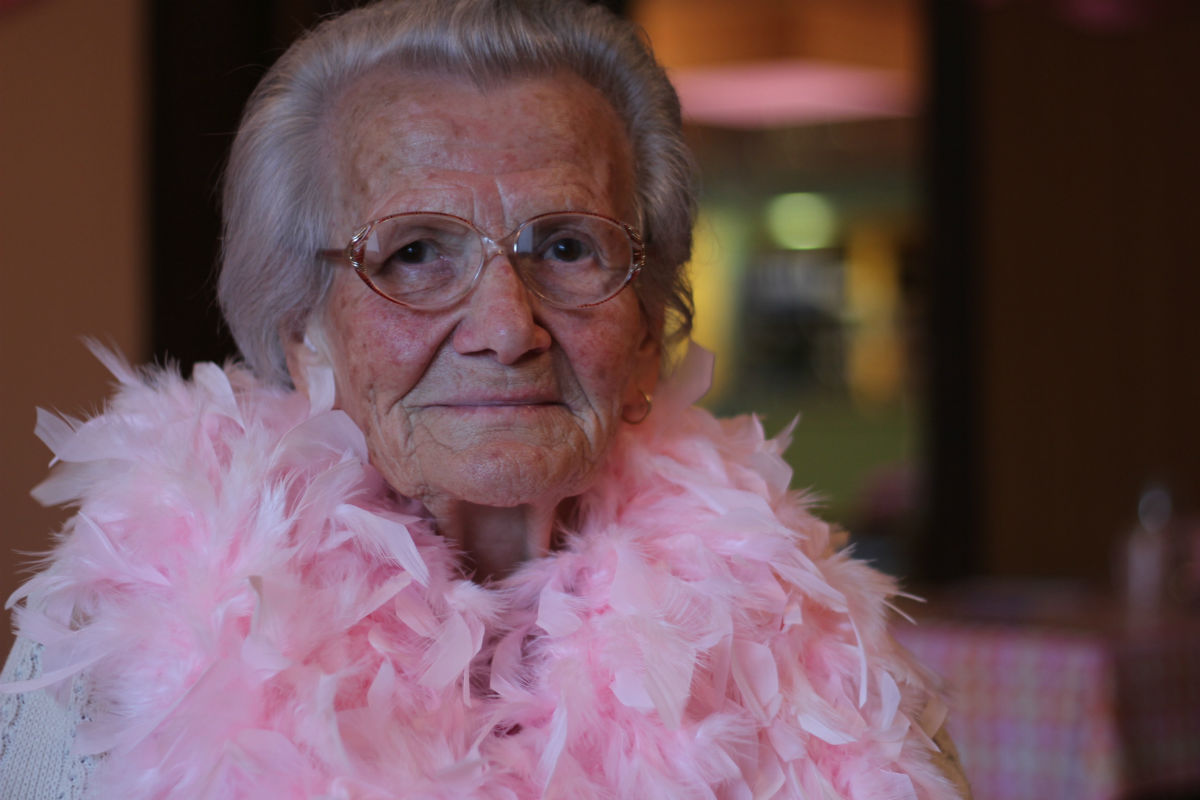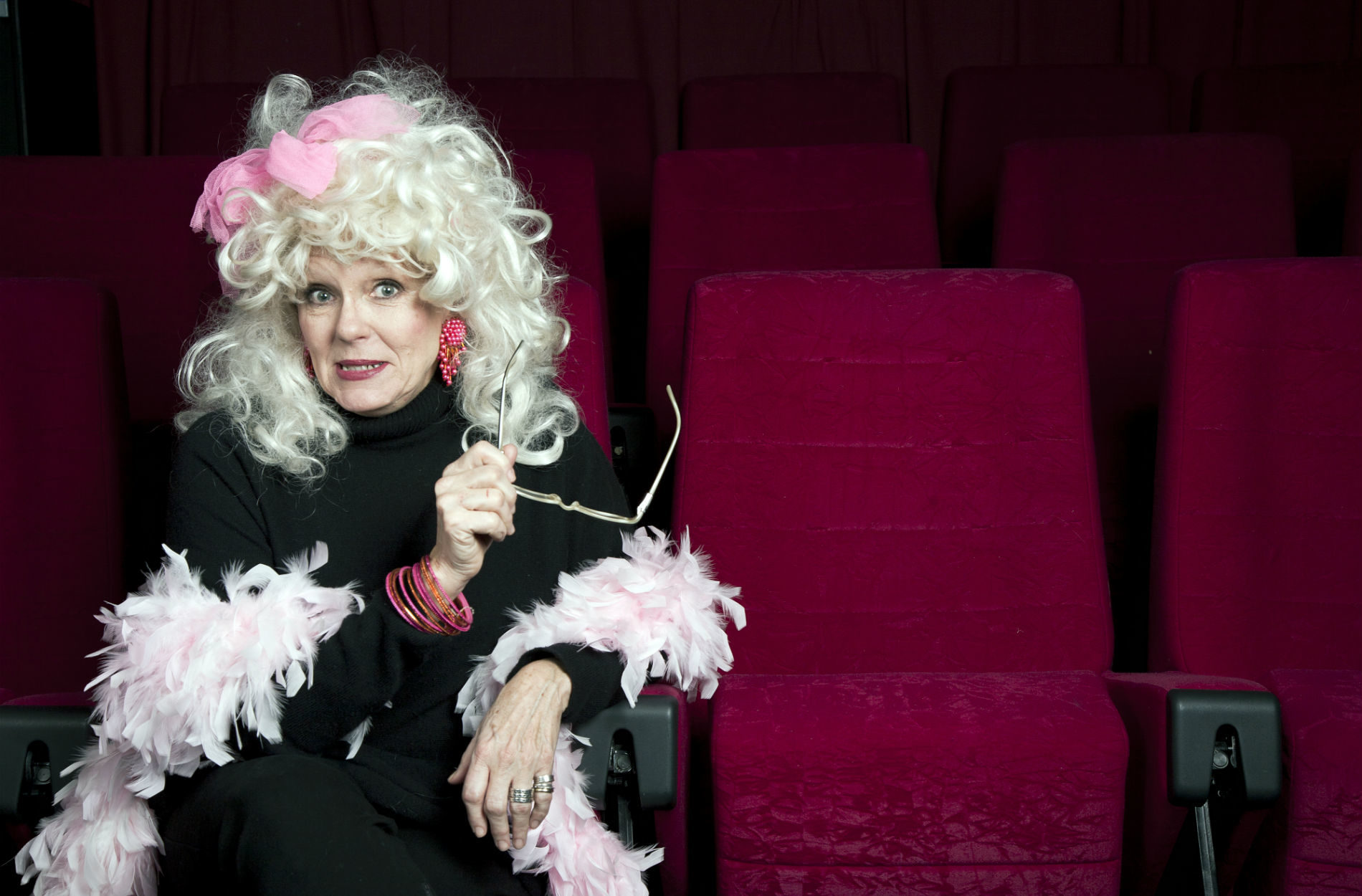Adam Weymouth meets Tammy WhyNot. They explore why we should keep talking about sex as we grow older, and how those conversations can also be a gateway into our feelings about identity, vitality, and dignity in older age
“I don’t know about you, but sometimes I just don’t feel like it. You know what I mean?” Tammy WhyNot is sat at the front of the stage in a blue boiler suit and peroxide blonde wig, and she is taking us into her confidence.
“I always thought I was going to be one of those people,” she says, “who had a girlfriend or a boyfriend in every town. Or that I was gonna be like one of those Duracell bunnies that hop from bed to bed. I at least thought I was gonna have sex on my death bed. But recently, I kind of just don’t feel like it. And I don’t quite know how to feel about that.” She looks up at us, shrugs, shakes her head.
Tammy WhyNot, so the story goes, was a famous country and western singer before she packed it all in for a career as a lesbian performance artist. She has been reworking her old material. “Y’all know Stand By Your Man?” she drawls, Deep South. “I did a feminist version of it. Stand On Your Man.” Now she is planning her comeback album. It’s going to be called ‘What Tammy Needs to Know About Getting Old and Having Sex,’ and she has gathered us all here, so she says, to the Arches in Glasgow, because she needs to do some research. A thumping baseline kicks in, the twang of a banjo, and Tammy begins to strip out of the boiler suit to her sequins underneath. “Yeeha!” whoops someone in the audience. “I’m over sixty and I’m in my prime,” she sings. “So many women, so little time/ You’d be so happy if I made you mine/ I’m bringing sexy back.”
“Y’all know Stand By Your Man?” she drawls, Deep South. “I did a feminist version of it. Stand On Your Man.”
Tammy WhyNot has been Lois Weaver’s alter ego since 1978, and she has been carrying around the wig in a bag since then. Now in her sixties, Lois is a professor of Contemporary Performance at Queen Mary’s University, and in 2014 was awarded a Guggenheim Fellowship. She founded the theatre troupe Split Britches in 1980, with long-time collaborators Peggy Shaw and Debbie Margolin, and over the years their performances have explored queer and lesbian cultures, feminism, class and gender violence.
“I hated country music,” Lois says to me during a break in rehearsals. “I was ashamed of my roots. Tammy was an opportunity to subvert and reclaim them.” Over the years she has morphed through various incarnations to become the woman that she is today: brash, unapologetic, unashamed of her desires, yet with a naivety, a vulnerability, that audiences seem defenceless to resist. As she walks through the stalls, microphone in hand, she generates an ease whereby the audience seems quite happy to discuss their sex lives in a room full of strangers. It is a little piece of magic that she attributes to Tammy, a magic that Lois, who always speaks of Tammy in the third person and describes her as her “superhero”, did not see coming either.
“I started to understand that she was really valuable in situations where the work itself was controversial, or maybe unconventional, and she could stand between the work and the audience as an interlocutor. If it was particularly dense or obtuse, vague, abstract, or even risky, she could embody that response for the audience, so that the audience could lean into the understanding of the piece a little bit more, through Tammy.”

Lois Weaver: Photo by Christa Holka
Whilst Tammy opens that space for the audience, she also opens it for Lois, who grew up in a working class family in the southern United States, and feels that her education was not as good as she would have wished. When she took a job as lecturer at Queen Mary’s, she felt awkward coming into an environment in which all of her colleagues were decorated with PhDs. “I’ve always lived with certain aspects of what I didn’t know,” she says. “Being suddenly in this context of knowledge made me feel inadequate, or worry about being inadequate. So I just brought Tammy right into that inadequacy, and set up ‘What Tammy Needs to Know’ segments in some of my weekly performances. I would bring in some of the professors from English and Drama, and get them to teach Tammy what she needs to know about cultural studies, or what she needs to know about musical theory. Through this I was looking at education and class, and I was also starting to interrogate what is expertise. I feel like we’re all experts.”
One can hear in this the work of Paolo Freire, the Brazilian educator best known for The Pedagogy of the Oppressed (1968). Freire turned what he termed the traditional, banking model of education on its head. Rather than students being empty repositories to be filled with the “official knowledge” of the teacher or the state, knowledge could be a co-creation between student and teacher, blurring the line between the two until they became indistinguishable. Freire, like Lois, believed that we are the experts of our own situation. She says that the results Tammy produced were as much instinctive as they were intentional, but when she saw audience members turning to each other and talking, teaching each other, she knew that she was doing something right. And in the Freirean tradition, as much as she is interrogating other lives, she is enquiring into her own.
“The biggest impulse was my own,” she says, speaking of her decision to start exploring sex and age. “I was getting different urges and desires, and I wasn’t ready to accept that as a physiological or psychological reality.” She was acutely aware that no one was discussing it: not her friends, not her peers, not the media, not academia. Did others feel like she felt? How did others deal with their bodies changing, their desires shifting, the changing balances of their hormones? “That was why I started to have the conversation,” she says. “It’s not so much about what I find out or not find out, it’s about opening up that possibility for people to talk about loss or desire or longing. Intimacy.”
“It’s not so much about what I find out or not find out, it’s about opening up that possibility for people to talk about loss or desire or longing. Intimacy.”
In 2008 she went to live for ten days, as Tammy, in a retirement home in Croatia. She describes her work as porch-sitting, chatting, getting to know someone, before starting the research proper. “I set up shop, and they came along and they talked to me about what it meant to be Croatian,” she says. “And then the next day they talked to me about romance, and then they’d talk to me about love. And then we started talking about sex.” And what did she learn? “That they were all doing it,” she laughs. “Definitely doing it. In the hallways, in the elevators.” There was a bar on the premises; the residents could take up a room together, just so long as their kids consented. Many of those she interviewed would come on stage with her for the performance at the end of her residency as her backing singers, the WhyNets.
After Croatia she went to New York, and found a similarly positive response, culminating in three weeks of shows with fifteen WhyNets, aged from 55 to 84. But in Britain the response has been less forthcoming, not from care home residents, but from the care homes themselves. “They think that their residents don’t want to talk about sex. Of course they do.” There has been, she says, “a lot of gatekeeping.”
She appreciates the need for sensitivity, but believes that a refusal to talk about a subject can be far more damaging than a denial of its importance, and she finds British culture to be particularly mute. When she was eventually given access to a care home in Manchester, her assumptions proved correct. “A lot of the women I was talking to had all read 50 Shades of Grey, they all really wanted to talk about that. Maybe they weren’t having sex, but they weren’t dead. They had imaginations, they had a sense of humour, they told me dirty jokes.” In another home, the director had a policy of not informing the other residents when one of their number died. She laughs, aghast. “Because it would upset them. As if they weren’t already thinking about their own disappearance and death. It seems like this is protection not just from a subject like sex, but protection from any kind of real emotion, or real life experience, once we get to a certain age.”
Care homes are expected to have given consideration to sexuality and relationships, yet a 2010 study by the Royal College of Nursing found that: “Staff are generally not comfortable with the topic, and not knowledgeable about it either, thus they are powerless to help.” The report discovered that it is a subject rarely broached in training, and that homes are not being run in a way that is conducive to relationships, failing to provide privacy for residents and with no access to double beds.
Dawne Garrett, Older People’s Advisor at the Royal College of Nursing, understands the caution, especially when dementia is a consideration, but recognises the great need for everyone, older people included, to be able to discuss their sexual needs. “The current research I’m doing reveals, if you give people the opportunity, they are very happy to talk about it,” Garrett says. “Human contact and sexual need are basic functions of the human being. On Maslow’s hierarchy they sit right at the bottom, basic level.”
In a room in Govan, south of the Clyde, Lois is meeting with the over fifties group at Plantation Productions, scouting for WhyNets for the show in two days’ time. The group meet once a week, producing short films and radio dramas. On the walls are photos from their productions, comedy skits, local documentaries, currently a play about the First World War.
Around the table are six or seven of them, from their fifties to their eighties. They are staring at Lois who disappeared into the toilets minutes earlier clutching her bag and has just emerged as Tammy, with a range of shock, flirtation and bewilderment. I wonder when the last time a country singer from Tennessee came to this particular bit of Glasgow. It is not going particularly well: it is hard to imagine how she might get them focused enough for any meaningful conversation; for now it is all cat calls and innuendo. “I’m going to take Tammy off for a moment,” she says. “Underneath Tammy is Lois.”
“I realised I couldn’t be Tammy,” she says to me the following day. “I knew it was such a fragile environment. It was getting a performance in response to a performance, and I didn’t have time to break that down.”
Years of doing this have attuned her to the specific situation, of what to ask, and when. With the wig off it is easier. She gets each person to speak about themselves. Most were born in Govan, several moved out when “the hooligans in George Square pulled the tenements down,” but since then they have trickled back. She asks them how they find the group and what they get from it, how they enjoy the performance, if they are married, if they aren’t. And slowly, as the conversation develops, Lois guides it towards relationships. I am struck as I listen, a mute observer at the back, at the sheer diversity of experience in the room. The recently widowed, those that married sixty years ago, those that have never had a relationship. There is Dona, who after having lost two partners, is dating again but has no plans to move in. “He lives on his own. I live on my own. We go out. Maybe he’ll come and stay for the weekend. But I wouldn’t live with him. I quite enjoy being on my own now. I don’t know if I’d like someone permanent.”
Someone else agrees. “I can go where I want when I get up in the morning.”
“That’s not appreciated in this culture,” says Lois.
There is Angus, 78. “I pushed my wife away when I was drinking,” he says. “That’s a big regret, aye.” He has since quit alcohol, and they have remained together. “She must be some woman, to put up with me. I met her at the kirk. I asked her out when we were 16, and we’re still going out.”
“And are you having sex?” asks Lois.
He laughs. “‘You’ve got a bed to sleep in’, she says. She’s told me to tie a knot in it. When she wanted it, I was too drunk to try. Now I want it, she doesnae want it.”
And there is Derek, who agreed with his partner to live in separate houses in the decade preceding her death. “My wife suffered from ill health, and I suffered from craziness. But we met every day of the week at our home, and we had long talks. And arguments. Debates. You know. It brought us closer together. I was quite hard to live with. We loved each other to bits, you know.”
“There are all these different ways to have love stories,” Lois says to them. “There’s loads of different ways to love, and I think it’s important to hear those stories.”
“You must hear everything?” I ask her later.
“Everything,” she says. “Everything. It’s a lot more varied than I thought it would be.” She tells me about a 67 year old woman she met in New York who had discovered internet dating and now had five boyfriends, and a man who had chosen to be celibate for the previous 25 years. An 84 year old woman looking for casual sex, and an 81 year old with a lover 18 years her junior who meet to have sex once a week.
And yet despite this breadth and diversity of experience, no one is talking about it. “I think they’re probably suffering from the assumptions that they’re too old to have sex, or that people think they’re not having sex,” says Lois. “Most people who say that they like the show, it’s because it gets us past thinking that they’re over it. After a certain age you just don’t think about it, you don’t do it, you don’t want it, and if you do you’re a dirty old man, or you’re a cougar. You have these stereotypes attached to you.”

Croatia: Photo by Claire Nolan
A study carried out this year by the University of Manchester found that 54% of men and 31% of women over the age of 70 were still sexually active. Never before has a study of this kind included participants over 80 in its sample, which goes some way to highlighting both how the taboo is shifting, and how the sexuality of older generations has been sidelined for so long.
And the silence surrounding the subject is having other, more concrete, repercussions. Public Health England’s 2015 study shows that for all STIs bar syphilis the over 65s are demonstrating the greatest rise in infection. Age and Ageing published a report in 2014, based on data from 2011, that showed the over 50s comprised one fifth of those living with HIV in Britain, up from one tenth in 2002, whilst in Brighton the incidence was as high as one third. HIV testing was not routine practice amongst an older demographic, wrote the authors, and they are not a target audience for sex education
“There’s so much more intergenerational marriage, there’s so much paid sex, there’s so many more new relationships in later life, and we have not been brilliant at targeting that group with health promotion,” says Garrett. “It’s getting much better, but that is an issue. These are often people who have not been entering into new relationships for many years and things have moved on, and they need to be aware of that.”
As we drive away from Govan, Lois is unsure if anyone will show up for rehearsals, but the next day there they are, four of them, along with four from previous sessions she has run. Lois has told them to come wearing what made them feel sexy, and they are here in dinner jackets and gowns, skirts and slicked and parted hair, perfumed and scrubbed and made up.
“For me, the biggest joy of this project,” Lois says to me the following day, “is not just getting people to talk about sex, but to see what happens to people when they come to the moment of performance, and how it makes people feel. What happens when you get looked at, how do you feel about yourself when someone’s looking at you, and you’re dressed up, and you’re performing, you’re showing up. The need to show up, whether it’s for your children, or for your church, or for performance, is something that keeps people from falling into that space where they don’t look after themselves. That’s when they start to deteriorate.”
“The gold standard of sexual contact,” Dawne Garrett said to me when we spoke, “is young, beautiful, usually white, usually blonde.” Films like The Best Exotic Marigold Hotel and programmes like Last Tango in Halifax are broadening the sorts of relationships we see on the screen, but they are still far from being commonplace.
That we pedal such a high bar of beauty and youth impacts on anyone outside of that gold standard. “That message goes out to older people, and then they themselves start feeling maybe what I’m doing I shouldn’t be doing.” This is true not just for age, but for different body types, sexualities, skin colours. For a society that professes to flaunt how comfortable it is with sex, it is remarkable quite how narrow minded we have become.
That we pedal such a high bar of beauty and youth impacts on anyone outside of that gold standard.
“I think at the root of all that is that we don’t accept,” says Lois. “We all want to stay young, be young, perform young, do young. For me, talking about sex isn’t about trying to get us to do that. It’s about getting us to accept where we are, and celebrate where we are, and include that as a part of it. Sex is the key into that conversation for me, because it’s fun and it gives us permission, but it’s not the only thing I’m interested in. I’m just interested in how we get older, and stay vital. I guess the word vitality, for me, is the underlying definition for sex and sexuality.”
That honesty and openness has resonated far behind those who Lois assumed would be her target demographic. On the night of the show Tammy takes a straw poll of the ages present. “Who here is in their twenties?” A swathe of the audience put up their hands. She looks at them quizzically. “Wow, how come y’all are here? You came to see this old lady talking about sex?” We are in our thirties, forties, right up to our seventies, and there is something in this intergenerational aspect that lends the show added weight. She calls the WhyNets up on stage for their first number.
“Don’t they look gorgeous?” she says. There are whoops and wolf whistles. “I just found them a couple of days ago.”
There is nothing illusory here, nothing patronising. It is the opportunity for individuals to honestly express themselves, to be heard, to be seen, in a way so regularly denied them. She invites some of them up individually, to talk about their lives. “I’ve had these fantastic conversations with people,” she says, “and some of them I would like to have in public.” It is a privilege, to listen. To hear people speak about menopause, loneliness, about love and loss, is to understand that in fact there is no fundamental difference between the twenty year olds and the eighty year olds in the room. We all have the same hopes, the same needs, the same fears. Tammy goes through her numbers, a song about swapping sex for shopping, another about falling in love with a woman with dementia. The WhyNets dance and twirl their umbrellas in unison and come in right on cue. It is, more than anything, a celebration. At the end there are standing ovations, cheers. The WhyNets bow and grin. “When you go through life,” Tammy says to us as we file out, “and you say to yourself, why get old, and why have sex, just think of Tammy, and you say why not.”
The bar is jumping afterwards. The ice is well and truly broken. Having already heard half the people there discuss their sex lives, everyone wants to chat. I ask Lois what all these performances have done for her. Has hearing about the sex lives of so many strangers changed how she thought about her own? “It’s made me feel more gentle on myself as an ageing person,” she says. “I think I held onto a tension about it as I began to lose my libido, or lose my desire. I thought is there something wrong with me? How can I fix this? And now I feel more open, I’ve let go of that, and so consequently I do have more sexual impulses. I can feel a shift in my own ageism, of who and what I find attractive, including myself. I feel that there’s more breath in it.” She pauses. “It’s just made me feel much more relaxed about sex in general, and life in general.”
“Maybe you should have done it forty years ago?” I say.
She laughs. “I was having pretty good sex then. That’s why it became an issue. I thought wait a minute. I’ve had a pretty wild ride. So what’s going on now?” She pauses, and looks at me. “That’s probably a good place to stop,” she says.
Banner Photo by Christa Holka
If you would like to read more of Adam’s work visit www.adamweymouth.com and
@adamweymouth



